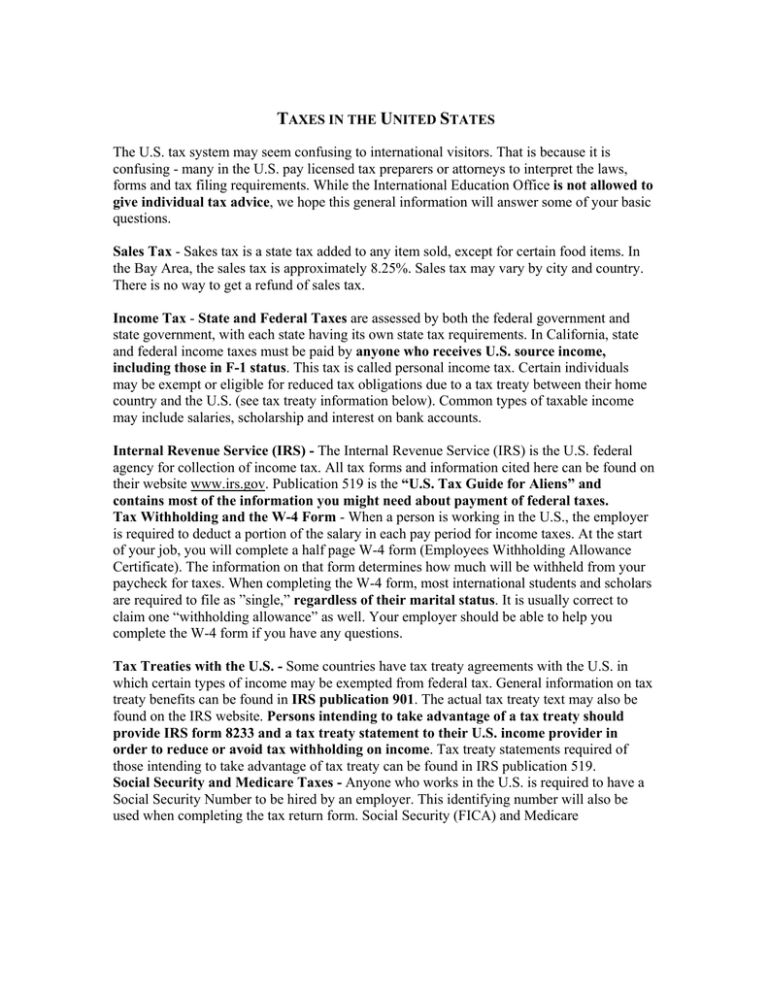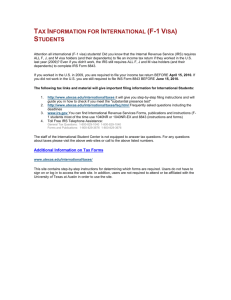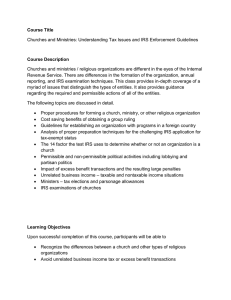T U S
advertisement

TAXES IN THE UNITED STATES The U.S. tax system may seem confusing to international visitors. That is because it is confusing - many in the U.S. pay licensed tax preparers or attorneys to interpret the laws, forms and tax filing requirements. While the International Education Office is not allowed to give individual tax advice, we hope this general information will answer some of your basic questions. Sales Tax - Sakes tax is a state tax added to any item sold, except for certain food items. In the Bay Area, the sales tax is approximately 8.25%. Sales tax may vary by city and country. There is no way to get a refund of sales tax. Income Tax - State and Federal Taxes are assessed by both the federal government and state government, with each state having its own state tax requirements. In California, state and federal income taxes must be paid by anyone who receives U.S. source income, including those in F-1 status. This tax is called personal income tax. Certain individuals may be exempt or eligible for reduced tax obligations due to a tax treaty between their home country and the U.S. (see tax treaty information below). Common types of taxable income may include salaries, scholarship and interest on bank accounts. Internal Revenue Service (IRS) - The Internal Revenue Service (IRS) is the U.S. federal agency for collection of income tax. All tax forms and information cited here can be found on their website www.irs.gov. Publication 519 is the “U.S. Tax Guide for Aliens” and contains most of the information you might need about payment of federal taxes. Tax Withholding and the W-4 Form - When a person is working in the U.S., the employer is required to deduct a portion of the salary in each pay period for income taxes. At the start of your job, you will complete a half page W-4 form (Employees Withholding Allowance Certificate). The information on that form determines how much will be withheld from your paycheck for taxes. When completing the W-4 form, most international students and scholars are required to file as ”single,” regardless of their marital status. It is usually correct to claim one “withholding allowance” as well. Your employer should be able to help you complete the W-4 form if you have any questions. Tax Treaties with the U.S. - Some countries have tax treaty agreements with the U.S. in which certain types of income may be exempted from federal tax. General information on tax treaty benefits can be found in IRS publication 901. The actual tax treaty text may also be found on the IRS website. Persons intending to take advantage of a tax treaty should provide IRS form 8233 and a tax treaty statement to their U.S. income provider in order to reduce or avoid tax withholding on income. Tax treaty statements required of those intending to take advantage of tax treaty can be found in IRS publication 519. Social Security and Medicare Taxes - Anyone who works in the U.S. is required to have a Social Security Number to be hired by an employer. This identifying number will also be used when completing the tax return form. Social Security (FICA) and Medicare are U.S. government programs that provide benefits for U.S citizens and U.S. permanent residents, usually for retirement. It is financed by taxes withheld from the paychecks of working people. F-1 student and scholars are not required to pay these taxes as long as they remain “non-resident for tax purposes” (see the chart in IRS publication 519). Those in F-1 status who have become a “resident for tax purposes” do pay Social Security and Medicare taxes. If Social Security and Medicare taxes are withheld in error, you can obtain a refund by following the instruction in IRS Publication 519. Individual Taxpayer Identification Numbers (ITIN) - The ITIN is a nine digit number issued by the IRS to individuals who are not eligible to obtain a Social Security Number, but who need a tax identification number. Most often this would be dependents, those in F-2 status (spouse or children of an F-1) who have not received INS work permission. ITIN is used for tax filing purpose; however some health insurers use the ITIN as the identification number. To apply for the ITIN, you must complete the IRS Form W-7. Allow 6-12 weeks after submitting the ITIN application for written receipt of your ITIN. If you have been issued an ITIN, it does not preclude applying for a Social Security number if you later become eligible for one. Annual Reporting Requirements – All international students and scholars in F-1 status whose tax filing status is nonresident must file some type of federal tax form regardless of whether or not they earned U.S.-source income or not. It is the responsibility of each individual to make sure they complete the correct forms and provide the appropriate attachments to the IRS. It is best to get organized early in the tax season, well in advance of the annual April 15 deadline. Should you encounter any difficulty in preparing your tax forms, we recommend that you consult with a tax specialist listed in the phone book yellow pages. Be sure to ask if they are well informed about your particular tax filing status (see “Residency Status for Tax Purposes” below). Residency Status for Tax Purposes - The IRS has its own meaning of the word “resident” for tax purposes, and it is different from the immigration meaning of the word. All F-1 students and scholars are considered “non-resident aliens” for immigration purposes. Some immigration “non-residents” may be called “resident” for federal tax purposes. Your tax filing status (resident vs. non-resident) is important because it determines which tax forms you should use to fulfill your federal tax-reporting requirement. F-1 students must consider themselves as “residents” for tax purposes after being in the U.S. for five tax years. Any part of a calendar year counts as a full year for both students and scholars. Those who do not meet the above description would file as “non-resident” for tax purposes. If you have no U.S. source of income other than bank interest, and are a “non-resident for tax purposes” you need only submit a form 8843 to the IRS to fulfill the tax-reporting requirement. Other federal and state tax forms are not required. Filing the Tax Return - Deadline April 15 – Individuals who received U.S. source income are required to submit a report to the IRS which shows the amount of income earned and taxes paid for the previous year. This report is called the tax return. In January of each year, employers are required to provide each employee with a summary of the total amount of taxes withheld in the previous year. This summary is the form “W-2” Wage and Tax Statement. Contact your employer if you do not receive your W-2 by February 1, as you must submit a copy of the W-2 to the IRS along with your tax return forms. In some cases, the excess will be returned to the person (thus the name “tax return”). However, if your employer did not withhold a sufficient amount of tax during the year, you may actually owe money. The formula for deciding the amount of tax obligation for working individuals changes every year—so it can be difficult to predict whether or not you will get a return of your taxes. When You Leave the U.S. - When you leave the U.S. to return home, you will still need to th file U.S. tax forms by April 15 of the following year. Michigan State Tax: If you are employed in the state of Michigan, your employer will also deduct money each month to pay for state taxes. Anyone who earns money in Michigan is th required to file a Michigan State income tax return. This is also due on April 15 . Federal Forms, Publications, and Instructions and Michigan State Forms and Instructions Download Federal Forms: www.irs.gov Download Michigan forms: http://www.michigan.gov/taxes/ Information collected from www.irs.gov and http://www.michigan.gov/taxes/ Updated 2012



